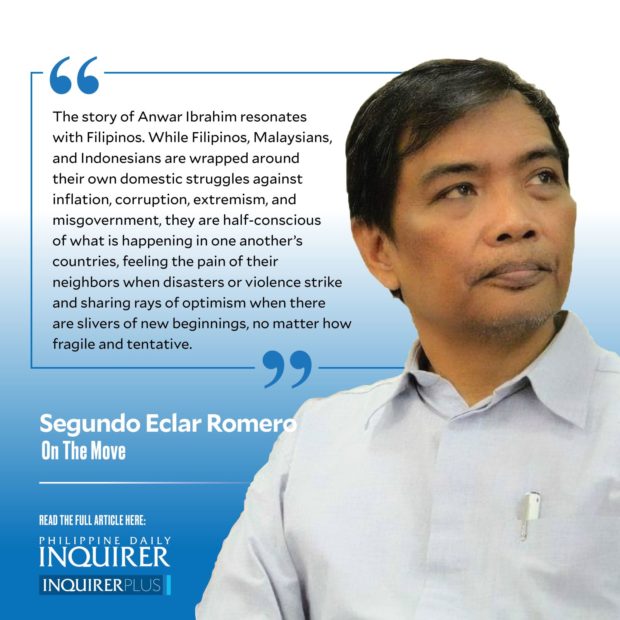Anwar Ibrahim: A new beginning for Malaysia
Anwar Ibrahim finally has become the prime minister of Malaysia. It was a painstaking and arduous ascent to power, after being jailed twice over 10 years.
Even then, it is just a toehold for Anwar that must be quickly consolidated. His coalition failed to win a clear majority in the recent elections, and the King of Malaysia stepped in to choose a leader of parliament who could form a Cabinet. He gives the Malaysians, including the politicians feeling the pulse of the people, a chance to take the pathway toward national unity.
Very courageously and astutely, Anwar has announced that the first order of business in parliament is to present himself and his coalition to a vote of confidence. One must take political risks to gain moral ascendancy.
President Marcos Jr. immediately called his “good friend” Prime Minister Anwar, expressing his hope that Anwar’s leadership will provide stability to Malaysia and the region. Former president Joseph Estrada was also pleased and excited with Anwar’s rise as prime minister. Anwar said he looked forward to collaboration with the Philippines in areas such as trade and investment, mindful of the two nations’ great traditions in the past.
The story of Anwar Ibrahim resonates with Filipinos. While Filipinos, Malaysians, and Indonesians are wrapped around their own domestic struggles against inflation, corruption, extremism, and misgovernment, they are half-conscious of what is happening in one another’s countries, feeling the pain of their neighbors when disasters or violence strike and sharing rays of optimism when there are slivers of new beginnings, no matter how fragile and tentative. Indeed, there have been uncanny parallelisms in the political sagas of these three Malay countries.
Increasingly, political events in neighboring countries are getting the attention of citizens. The return of the Marcoses to power after being driven away in 1986 sent shudders to Malaysians as they contemplated parallelisms in the Malaysian political future. Former prime minister Najib Razak may be in jail for looting the 1Malaysia Development Berhad state fund, but how likely will a return to power Marcos-style be?
For Filipinos, the love-hate relationship between Mahathir and Anwar over the last 30 years shows not only how zigzagged the ascent to the top can be, but that in politics, there are no permanent enemies, only permanent interests. While Anwar, an erstwhile prisoner, is now prime minister, in the Philippines, over the past two decades, presidents and senators have become prisoners, and prisoners have gone back to being senators and legislators.
But there are bright spots. Anwar now focuses on forming a national unity government based on good governance, no corruption, and Malaysia for Malaysians. His Cabinet will include his former foes. Mr. Marcos campaigned on a platform of “unity,” and his Cabinet has drawn from various political formations. Have the leaders of countries of Southeast Asia acquired enough domestic turbulence to now have the political experience and maturity to invest more resources toward the Association of Southeast Asian Nations (Asean) as a genuine instrument of regional peace and development?
In the case of the Philippines, Mr. Marcos appears to be more confident and comfortable in foreign affairs and the regional and international arena than his in domestic politics. He has not missed any of the regional forums that have come his way since he became President, and he has sought more foreign trips abroad, including to China and the United States. We recall that his first trips abroad were to Singapore and to Indonesia, but not Malaysia. The ascension of Anwar as prime minister brings Malaysia to Manila’s circle of close neighbors.
Could a confluence of like-minded leaders of key Asean member countries signal a whiff of change in Asean? President Jokowi of Indonesia, Prime Minister Lee Hsien Loong of Singapore, and now the “old” new kids on the block, President Marcos Jr. of the Philippines and Prime Minister Anwar Ibrahim of Malaysia, may hold that promise. Hopefully, Thailand can retrace its steps toward democratic governance and rejoin the Asean core group as it started in 1967.
It is time to cobble and strain toward a long-term strategic regional cooperation design founded on greater commitment among members that translates into demandable rights and obligations. For one, Asean should stop confusing itself and its peoples with hoary concepts such as the zone of peace, freedom, and neutrality that only disarms them before the expansionist and aggressive bully on the bloc.
doyromero@gmail.com





















